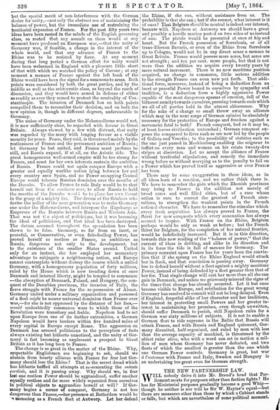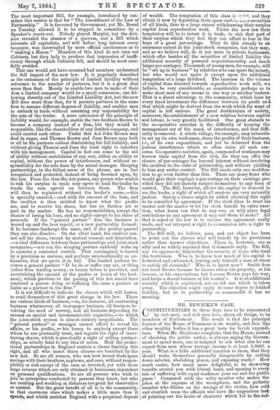THE NEW PARTNERSHIP LAW.
WILL nobody drive it into Mr. Brand's head that Par- liament meets for purposes other than faction fights ? He has for Ministerial purposes gradually become a good Whip— though he neither is nor will be Sir W. Hayter's equal—bat there are measures other than those by which a Cabinet stands or falls, but which are nevertheless of some political moment. The most important Bill, for example, introduced by out- siders this session is that for "The Amendment of the Law of Partnership." It is favoured by Government, yet Mr. Brand on Tuesday allowed it to be stopped in committee by a Speaker's count-out. Nobody played Marplot, but the divi- sion revealed the absence of a quorum, and a Bill which interests all capitalists, and will before long interest every taxpayer, was interrupted by mere official carelessness as to "making a House." Blunders of this kind do not turn out Cabinets, but they help to produce that impression of ineffi- ciency through which Cabinets fall, and should be most care- fully avoided. This one would not have occurred had members understood the full import of the new law. It is popularly described as the extension of the principle of limited liability without reference to the number of partners, but it is a great deal more than that. Merely to enable two men to make of their firm a limited company would be a small concession, one fol- lowing directly out of the Limited Liability Act, but the new Bill does more than that, for it permits partners in the same firm. to assume different degrees of liability, and enables men to embark in trade without assuming any responsibility for the acts of the trader. A. mere extension of the principle of liability would, for example, enable the two brothers Brown to become a company instead of a firm, but they would be responsible, like the shareholders of any limited company, and could control each other. Under this Act John Brown may deal in sugar, and Thomas Brown and Jane Brown may both or all be his partners without diminishing his full liability, and without giving Thomas and Jane the least right to interfere with his management. Capital in fact can come to the aid of ability without restrictions of any sort, either on ability or capital, without the power of interference, and without re- sponsibility for the acts done by the actual manager. Sleeping partnerships, in the fullest sense of the phrase, are in fact recognized andprotected, instead of being frowned upon, by the law. From the time the Act passes, any person who wishes to risk his surplus in trade may agree to lend the trader he trusts the sum agreed on between them. The firm will then be registered without the lender's name,—this is specially enacted,—and with the amount of the loan, and the creditor is then entitled to know what the profits are, and to receive his share, but has no further art or part in the matter. He has no responsibilities, except the chance of losing his loan, and no rights except to his share of proceeds. If the "general partner" dies the business is wound up and the loan repaid, or a new partnership formed ; if he becomes bankrupt the same, and if the parties quarrel they can also dissolve. On the other hand, the creditor can- not sell his share, except by mutual consent and dissolution, —a vital difference between these partnerships and joint-stock companies,—nor can the sleeping partner suddenly wake up to exercise a contested control. That contingency is barred by a provision so curious, and perhaps unintentionally so ex- haustive, that we quote it in fell. The limited partner be- comes a general partner "If he do or suffer any act, or thing (other than lending money, as herein before is provided, and ascertaining the amount of the profits or losses of the busi- ness), which previous to the passing of this Act would have rendered a person doing or suffering the same a partner or liable as a partner in the firm."
It is not difficult to indicate the classes which will hasten to avail themselves of this great change in the law. There are various kinds of business,—as, for instance, all contracting business whatsoever, all newspaper business, all business in- volving the need of secrecy, and all business depending for success on special and incommunicable capacities,—to which the joint-stock system is almost entirely inapplicable. The "general partner" or manager cannot afford to reveal his affairs, or his profits, or his losses, to anybody except those whom he can personally trust, and regards the right of trans- ferring shares, which is practically a right of selling partner- ships, as utterly fatal to any idea of union. Half the profes- sional partnerships in England contain a clause limiting this right, and all who insert those clauses are benefited by the new Act. So are all women, who can now invest their spare savings with their brothers, nephews, and sons, without respon- sibility or risk except of the sum so invested, yet with those large returns which are only obtained in businesses dependent on personal qualifications. So are all persons who wish to join in enterprises conducted by persons they know, but who are residing and working at distances too great for observation or control. But the great benefit of all is to the community, to that enormous class which makes a little more than it spends, and which enriches England with a perpetual deposit of wealth. The temptation of this class is rel;et, and they obtain it now by depositing their spare cash in iixed-securities of all kinds, thus to a large &tent withdrawing their surplus capital from reproductive work. Under the new law their temptation will be to invest it in trade, to risk that part of their surplus which they feel they can afford to lose in the hope of a great per-centage. They do this already to an enormous extent in the joint-stock companies, but they may, and as we believe will, do it yet more in private businesses, which offer besides all the securities of limited liability the additional security of personal acquaintanceship and much larger per-centages. Thousands of young men, for example, will be "set up in business" by relatives who can spare the money, but who would not spare it except upon the additional temptation of a large dividend. The increase in the volume of capital thus directed towards reproductive work will, we believe, be very considerable, so considerable perhaps as to make most men of any means in one way or another traders. That is a direct advantage to the community, which loses by every fixed investment the difference between its profit an d that which might be derived from the work which for want of capital is left undone. Thee great desideratum of society, moreover, the establishment of a new relation between capital and labour, is very greatly facilitated. One great obstacle to the co-operative societies is the difficulty of keeping the management out of the reach of interference, and that diffi- culty is removed. A whole village, for example, may subscribe to set up its own tradesmen, share the profits of their business, i.e., of its own expenditure, and yet be debarred from the jealous interference which so often rains all such con- cerns. Co-operative societies, again, composed of workmen may borrow their capital from the rich, for they can offer the chance of per-centages far beyond interest without involving the creditor in the risks of partnership, and without yielding to him any undue control. The Bill needs only one modifica- tion to go even farther than this. There are many firms who would give their employ4 a per-centage on their earnings pro- vided they did not thereby subject themselves to any form of control. The Bill, however, allows the employe to demand to see the books, a right of which all masters are very naturally jealous. Surely a clause might be added allowing this right to be cancelled by agreement. If the clerk likes to trust his master and the master to let his clerk benefit by extra exer- tion, what harm can that do any one, or why place legal restrictions on any agreement it may suit them to make? All that is asked of the law is to enforce the agreement really made, and not interpret a right to commission into a right to partnership. The Bill will, we believe, pass, and our object has been to point out the classes who will benefit by its provisions rather than answer objections. There is, however, one so silly and so widely repeated that it demands reply. The Bill, say its opponents, diminishes the security of those who trust the tradesman. Who is to know how much of his capital is borrowed and exhausted, leaving only himself a man of straw to satisfy all demands ? Who is to know now ? Smith does not trust Brown because he knows either his property,. or his income, or his expectations, but because Brown pays his way, and keeps a decent balance at his banker's. It is an additional security which is registered, not an old one which is taken away. The objection might apply in some degree to limited liability, but as to partnership ea commandite it has no meaning.































 Previous page
Previous page